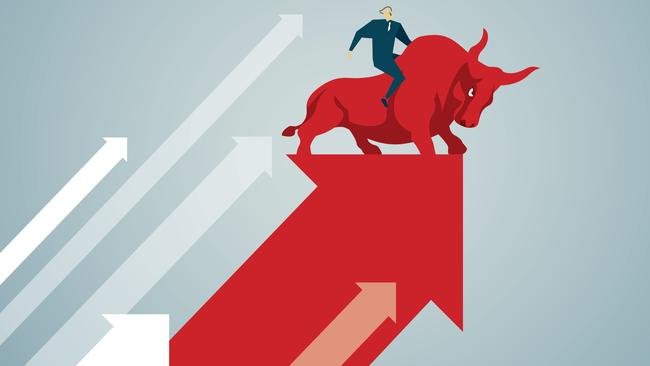Dividends can’t keep fuelling surging stockmarket
A record-breaking sharemarket runs on record-breaking dividends that cannot be sustained.

Gasp! If you have an exchange traded fund over the S&P/ASX 200, you have just made the easiest money in your life.
And there is nothing like a sharemarket record to focus the investor’s mind. Australian investors have watched in vain as Wall Street struck new highs long before we did. In fact, all three major indices in the US notched up another top this week.
READ MORE: Could the ASX be reaching the peak? | What if interest rates stop going down? | JPMorgan’s John Normand stays bullish on equities over bonds
As we celebrate the S&P/ASX 200 level of near 6890, we have made a big job indeed of fully transcending the pre-GFC record, when we hit 6828 in November 2007.
Can it keep going? The simple answer is yes, if Wall Street can, too. We slavishly follow US market patterns and just now the US is looking very good indeed. Basically, 75 per cent of US stocks are moving higher compared to less than 50 per cent this time last year: that is what you might call positive momentum. Historically, there has only been four times since 1950 when Wall Street gave negative returns in December.
Global markets are moving higher for two key reasons: the anticipation of a modest global recovery next year and the unexpected extension of low rates we saw throughout the last calendar year.
In Australia we have a flat economy where even further interest rate cuts are expected on our diminished official rate of 0.75 per cent. But offsetting that factor is the very attractive level of dividend yield available on the ASX.
Think of the dividend yield as the interest rate paid by the market. The income you can reasonably expect from shares regardless of their direction. On the ASX, the dividend yield rate is 4.5 per cent — in other words, the market’s rate is about three times higher than cash rates. This is the touchstone of sharemarket just now — it is all about the ability of the market to create income where income is nowhere to be found.
And on this narrow criteria it just so happens the Australian sharemarket is a world leader.
Here’s why: the Australian dividend rate hovers at 4.5 per cent thanks to a coterie of powerful companies that dominate their markets and create huge cash flows, which can be difficult to fully reinvest if the group restricts itself to our shores. The easiest solution to the issue is to give money back to shareholders in the form of dividends. This is a pattern you can see typified at the big banks, telcos and supermarket groups.
On top of that, dividends are highly prized by private investors due to our franking system (which after the recent election is now effectively enshrined in law for another generation). The franking system beefs up the ultimate returns for many investors, especially older investors.
But there is a big, fat problem here — our blue-chip companies lead the world as dividend payers but actually they can’t afford to be in that position. They are stretching their numbers to have the lead, says London-based fund manger Janus Henderson, which each year produces a global dividend index.
Janus Henderson says the global median dividend payout ratio is 60 per cent, but Australia is running at 70 per cent. This discrepancy may not sound like a big deal, but it is terribly important when you have a market riding high on the back of dividends.
What’s more, this gap has not been missed by professional investors. Earlier this week Aaron Binstead, portfolio manager at Lazard Equities Australia, highlighted how our biggest dividend payers — the banks — are now in the gun as they need to bring their dividends into line against the backdrop of falling profits.
With some banks still close to 80 per cent — plus, Binstead says the global median of 60 per cent is where they must get to.
“This is the level our banks need to be at with the return on equity they now generate and the capital they need to hold,” he says.
So if you wonder where this market might go next, one thing we know is that it is substantially driven by dividend payments and they are going to have to be cut in the months ahead unless there is some extraordinary turnaround in the real economy.
In fact, some of our key stocks have already cut their dividends. Telstra, Westpac and NAB have made cuts, while ANZ cut franking by 30 per cent, which for many investors amounts to the same thing as a payment cut.
This is just the start. Even if we assume the conditions in the wider market are no better or worse next year, dividends will have to be cut across the board. Moreover, the prospect of dividend growth will only be entertained by the strongest companies with the least pressure on dividend payout ratios.
Leading brokers are forecasting a total return next year of perhaps 10 per cent. Now, just about every other year they forecast 10 per cent, but the point to digest is that in 2019 the market looks like gaining 20 per cent-plus before we even consider dividends (which will add another 4 per cent).
The chances of next year returning anything like it has over the past 12 months are very low indeed, and that is substantially due to our dividend rate which can only dwindle from here.




Is this a parallel universe? The Australian sharemarket this week hit an all-time record. We are looking at about 22 per cent growth in share prices this year — or to put that another way, the sharemarket is growing at least 10 times faster than the economy.